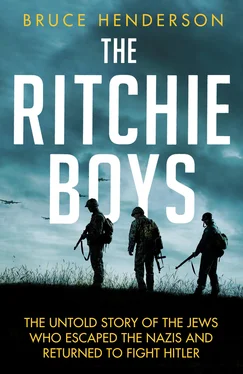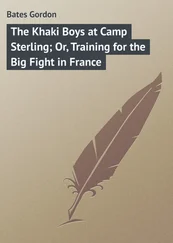Günther, the eldest child of Julius and Hedwig Stern, was four years older than his brother, Werner, and twelve years older than his sister, Eleonore. The family was solidly middle class, as were most of Hildesheim’s Jews. The Sterns lived in a rented apartment abutting Günther’s father’s small fabric store, which was located on the third floor of a well-maintained building near a bustling marketplace in the center of town. The apartment had high ceilings and good light. Fine curtains draped the tall windows. Each room had a wood-burning stove for heat, and the kitchen was outfitted with a modern stove.
The two boys shared a room on one side of the apartment. Their parents’ bedroom, where their little sister also slept, was at the other end. The bedrooms had hardwood floors; the carpeted living room had a sofa, two upholstered chairs, and Julius’s dark wood desk. The formal dining room, with a pastoral landscape by the Austrian artist Ferdinand Georg Waldmüller on the wall, was reserved for special occasions. Günther and his brother’s favorite part of the house was a tile-floored vestibule that served as an indoor playground, complete with a Ping-Pong table that they put to regular use.
Günther’s father was a slight man known for his boundless energy. Julius Stern worked six-and-a-half-day weeks, taking off only Saturday mornings to attend synagogue, where the sermon was in German and the service in Hebrew. He showed fabric samples and took orders in his store and on trips to outlying villages, where he called on customers who made their own clothing. The only ready-to-wear clothes he sold were men’s gabardine overcoats. His wife, Hedwig (née Silberberg), did his typing and billing. A raven-haired woman with dark, soulful eyes, Hedwig had a gift for writing witty limericks featuring relatives and friends.
Günther began his education in a one-room Jewish school. His teacher met the challenge of keeping students of varying ages and grade levels interested and engaged throughout the school day. None of it was lost on Günther, and he blossomed as a serious reader and an excellent student. Günther also enjoyed attending a Saturday afternoon youth group conducted by the synagogue’s charismatic young cantor, Josef Cysner, who led lively discussions about Jewish books and culture.
As was customary, Günther entered Andreas-Oberrealschule at age ten, in 1932. He was one of three Jews among his incoming class of twenty students. Even before starting school, Günther had had many non-Jewish friends; in Hildesheim at the time, young gentiles and Jews easily assimilated. They visited one another’s homes, attended the same parties, bicycled and swam together, and played soccer in the same athletic clubs.
But in 1933, the Nazis came into power, and they immediately started passing restrictive new laws targeting Jews. Hitler pledged to transform the nation: “Give me ten years,” he promised prophetically that year, “and you won’t recognize Germany.”
On April 1, 1933, two months after Hitler became chancellor, the government called for a twenty-four-hour nationwide boycott of Jewish-owned businesses. Storm troopers stood in front of stores, denouncing the proprietors and blocking the entrances. Jude was smeared on store windows; stars of David were painted across doorways. Local boycotts of Jewish businesses spread throughout Germany. Nazis marched through the streets, shouting anti-Jewish slurs; oftentimes these processions were accompanied by arrests, beatings, and extensive property damage.
Like many Jewish proprietors, Julius gradually lost most of his non-Jewish customers. They were afraid to be seen coming and going from his store; when he went to call on them at their homes, he was greeted by signs that read: JUDEN IST DER EINTRITT VERBOTEN. (Jews are forbidden entry.)
At the time, Günther, though an inveterate newspaper reader, had only a partial understanding of what was taking place in Germany. But he noticed when his friends became slow to greet him and then stopped speaking to him altogether. He found himself being invited to fewer birthday parties, and he was soon banned—along with the other Jewish youth of Hildesheim—from swimming at the local pool and playing on his soccer team. Even his athletic club eventually kicked him out; though he had accumulated enough participation points to earn a medal, he was not awarded it. These were formative years for Günther, and it hurt him deeply to realize he had become an outcast among his peers. The rupture in his young life was unexpected and wrenching.
At school, many of the teachers were replaced by newer instructors, from Berlin and elsewhere, who wore swastika pins and espoused Nazi propaganda. While a few of the older teachers showed empathy toward their Jewish students, they had to be careful for fear of being reported and losing their jobs.
For a time, Günther had a protector: Heinrich Hennis, a bright boy who was a year older and a head taller. More than once, Heinrich jumped between Günther and his tormentors. But all the non-Jewish boys were required to join a Nazi youth organization, and Heinrich was no exception. His leader singled him out for special indoctrination, perhaps because word had gotten around that he was protecting Jews. Eventually, Heinrich also stopped speaking to Günther. Soon, Nazi slogans spouted from the lips of this former friend.
Choir had always been one of Günther’s favorite classes. A few years earlier, his parents had taken him to the world-famous Hanover opera house for a performance of Wagner’s Lohengrin. Ever since, he’d enjoyed music and choral singing. But one afternoon after the Nazis came to power, the choir teacher had the students rise to sing “Deutsche Jugend heraus!” Written a few years after Germany’s defeat in World War I, the song’s lyrics were violent and provoking: “German youth, gather! Slay our enemy in his own backyard, down him in earnest encounters.” Embraced by Hitler Youth organizations for its rousing nationalism, the song had been included in a 1933 songbook released by a pro-Nazi publisher.
It was Günther’s old friend, Heinrich Hennis, who indignantly shouted to the teacher: “How can you let Jews sing a song about German youth?”
The choir teacher stopped and said apologetically, “Our Jewish students will sit this one out.” Günther and the two other Jewish students sat down and remained silent as the class sang. Mortified and angered at the same time, Günther realized the Nazis had found a way to take even music from him.
Throughout 1933, Günther watched as German and European history was literally rewritten. One day, his history teacher came into the classroom and passed out single-edge razor blades. “Take out your textbooks,” he ordered the class, and he began writing page numbers on the blackboard. The students were to cut out the listed pages from their books and replace them with new pages. “Be sure to leave enough room on the margins,” he added helpfully, “so you can paste the new pages into the book.”
Excited murmurs rose up at this unusual assignment. When a razor blade reached Günther, he did as instructed. A few pages into the cutting, he began to read the passages, and realized with a jolt that the pages being taken out of the books all dealt with major accomplishments by Jews.
As the non-Jewish students were subjected to more and more anti-Semitic propaganda, at school and at home, they became increasingly hateful and aggressive toward their Jewish classmates. One day after school, Günther was cornered and beaten up by five boys from his school who took turns striking him as the others held him down. He limped home, bruised and battered physically as well as emotionally.
Nor was his family spared such violence. One night, his father worked late, and he took some letters to a mailbox a block away. On his way home in the dark, he was jumped by several men spewing anti-Semitic curses. They hit and kicked him. A sympathetic policeman passing by found Julius crumpled on the ground and took him to a hospital for first aid. When Günther saw his father the next morning, his father’s face was covered with cuts and bruises.
Читать дальше












